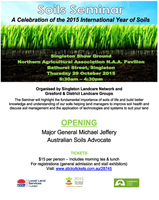
Former Governor General, Major General (retired) Michael Jeffery at the soils seminar at Singleton.
Forget about all the other threats and issues that dominate the media and think about soils.
Because healthy soils are needed to sustain life – it’s that simple.
That was the message former Governor General, Major General (retired) Michael Jeffery wanted his audience to take home from his opening address at the Soils Seminar in Singleton.
Organised by the Singleton Shire Landcare Network and Gresford and District Landcare the day attracted more than 150 participants keen to hear the latest information on soils and how best to manage them in a changing environment.
The day was described as a celebration of the 2015 International Year of Soils and in Major General Jeffery one could not find a more passionate advocate and educator on the importance of soil health.
He is Australia’s Advocate for Soil Health, a position he has held since 2012, and he has travelled to every state and territory to meet with farmers, scientists, policy makers, students and community groups to learn abut soil management issues.
He told his audience not to worry about the threat from IS or the future of same-sex marriage because the biggest question humans had to worry about was how to feed the world’s ever-growing population.
The world’s population will increase from 7.2 billion to nearly 10 billion in the next 25 years. “How are we going to feed that number,” he asked.
Major General Jeffrey also spoke about water shortage, citing the example of California, which only has 1.5 years of water supply left in its aquifers.
“Food and water scarcity is our biggest challenge,” he said.
“So we have to take an innovative approach to food production and ensure we have expert land managers who know how to produce and maintain healthy soils.
“Healthy soils are our lifeblood.”
Major General Jeffrey spoke about the destruction caused by wildfires not only in Australia but globally. He said the world needed to ensure they were eliminated wherever possible.
He described the successful management on the property Beetaloo, near Katherine in the Northern Territory, which covers 1million hectares.
The property used to run 25,000 head of cattle but a switch to intensive cell grazing resulted in the carrying capacity rising to 100,000 head with no more wildfires.
To encourage a better understanding of soils Major General Jeffery said every school in Australia should have its own vegetable garden.
“That way the next generation learns to understand how healthy soils grow healthy foods,” he said.
Urging his audience to become proactive, he said everyone who eats should get involved in promoting healthy soils.
“Healthy soils are the guts of it all,” he said.
Climate patterns are changing in the Hunter Valley and farmers will have to adapt to those changes.
Well-known Hunter-based agronomist Neil Griffiths, who has worked in the region since 1985, told the audience at the Singleton Soils Seminar that data on the Hunter’s weather patterns showed certain changes.
Most notably the first frost is occurring later, the winters are shorter and the first hot day is taking place earlier in the season.
The figures are based on weather observations between 1957-2009 and although temperatures are varying rainfall remains as ever up and down with no distinct change.
Now working as a technical specialist pastures with the Department of Primary Industries based at Tocal, Mr Griffiths said the general trend to shorter winters would have an impact on ryegrass production.
“The ryegrass growing season, in comparison with the 1950s, is now one to two months shorter,” he said.
“As ryegrass is a major source of fodder on our dairy farms this change will have an impact and require management changes.
“We are also seeing more extremes in temperatures and that means more management issues.”
Mr Griffiths went on to to explain how much nutrient was taken out of the soils citing the example that a tonne of hay took 30kg of nitrogen, 3.5kg phosphorous and 17kg of potassium.
“Times that over 50 years of production and you can see tonnes of nutrients are taken from our soils,” he said.
Standing near a sign of one of the mining companies that co-sponsored the day Mr Griffiths said mine companies wouldn’t be the only people who had mined the Hunter Valley.
“Nutrient depletion is now a major issue and it is something every farm manager should be looking at,” he said.








